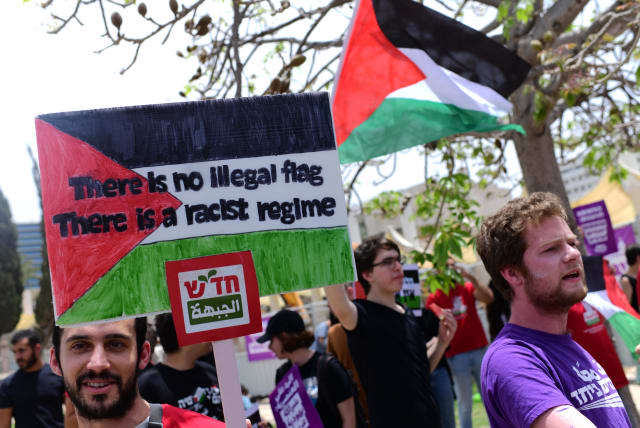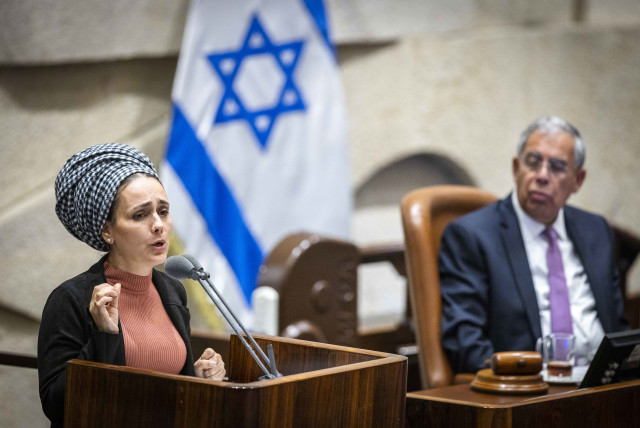Bill proposal removing 'terror-supporting' students from Israeli universities postponed

A-G Baharav-Miara warned that the bill would curb freedom of speech and could face "constitutional difficulties."
Debate over a bill by Otzma Yehudit MK Limor Son Har-Melech to remove students who support terrorism from universities will be postponed for a month, the Ministerial Committee on Legislation said Sunday. The bill restrains freedom of expression and would face “constitutional difficulties,” Attorney-General Gali Baharav-Miara wrote.
Students who express support for an armed conflict by an enemy state or terrorist organization against the State of Israel, who express support in acts of terrorism or in terrorist organizations, or who wave a flag of an enemy country, terrorist organization or the Palestinian Authority will be suspended from their academic institution for 30 days, the bill says.
If a student commits one of the above a second time, he or she will be expelled from the institution permanently and will not be able to receive an academic degree in Israel or recognition of an academic degree from a foreign university for five years, it says.
The bill also says an academic institution must prevent the activity of a student cell that commits one of the infractions listed above; must permanently expel a student who belongs to a terrorist organization or who was convicted for an act of terrorism; and the Council for Higher Education must ban students who were convicted for acts of terrorism from receiving an academic degree or having a foreign degree recognized in Israel for a period of 10 years.
“Academic institutions have become in the past year a central stage for incitement against the State of Israel,” the bill says.
Students at Tel Aviv University, Ben-Gurion University of the Negev and the Hebrew University of Jerusalem held demonstrations in favor of an intifada, and in some cases, they expressed support for terrorists from terrorist organizations, the bill says.
“It is unthinkable that students must study alongside those who expressed explicit support for terrorist attacks, while the management of the institution remains silent,” it says.
The A-G office's concerns about the bill
The Attorney-General’s Office told the Ministerial Committee on Legislation there were “constitutional difficulties” in the proposal.
“Waving flags may be done in different contexts,” it wrote in a legal opinion. “Some may indeed be to identify with the organization, but others could be for other purposes, such as criticism.”
Applying sanctions on the waving of the Palestinian flag was especially problematic, it said, adding that even though the flag is also that of the PLO, which has a status of a terrorist organization that has never been rescinded, “If the waving was not done out of identification with the PLO, but rather with the Palestinian people, for example, the waving is not illegal… a ban on waving the flag of the Palestinian Authority, without a necessary element connecting the waving with actual terrorism, enhances the damage to the freedom of speech in its most basic form.”
Another difficulty in the bill was that academic institutions do not have the necessary expertise to determine what is considered support for a terrorist organization or act and what is not, and therefore, they could apply sanctions when they are not warranted, the Attorney-General’s Office said.
Another possible outcome could be a “cooling effect” for acts that are not supportive of terrorism, but rather, while not in consensus and sometimes “infuriating,” stand at the heart of the freedom of speech.
“Universities are considered vital and special places for exchanging ideas and developing political and social views, and therefore, there is special importance in maintaining freedom of speech precisely within their boundaries,” the Attorney General’s Office wrote.
Supporters of the bill call to advance
MK Limor Son Har-Melech, who proposed the law, criticized the legal opinion.
“The law that I proposed is necessary in the fight against terrorism, and the attorney-general’s decision to oppose it raises difficult questions about a democratic country’s ability to defend itself from a fifth column embedded deeply within it,” she wrote. “Unfortunately, we are dealing with an extremely worrying phenomenon where, under the cover of freedom of expression, terrorism-supporting cells are rising within universities, who are not deterred from inciting terrorism and violence from within the campuses themselves.
“The meaning of the attorney-general’s opinion is the giving of a free hand to those terrorist cells to continue to incite against Israel. I call on the government to continue advancing the bill,” Son Har-Melech wrote.
Jerusalem Post Store
`; document.getElementById("linkPremium").innerHTML = cont; var divWithLink = document.getElementById("premium-link"); if (divWithLink !== null && divWithLink !== 'undefined') { divWithLink.style.border = "solid 1px #cb0f3e"; divWithLink.style.textAlign = "center"; divWithLink.style.marginBottom = "15px"; divWithLink.style.marginTop = "15px"; divWithLink.style.width = "100%"; divWithLink.style.backgroundColor = "#122952"; divWithLink.style.color = "#ffffff"; divWithLink.style.lineHeight = "1.5"; } } (function (v, i) { });

